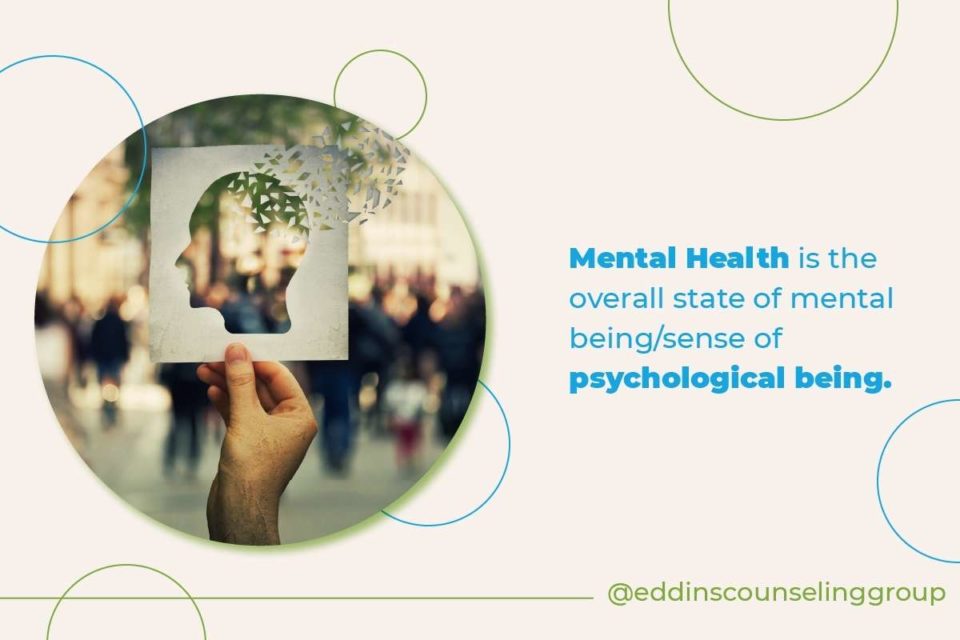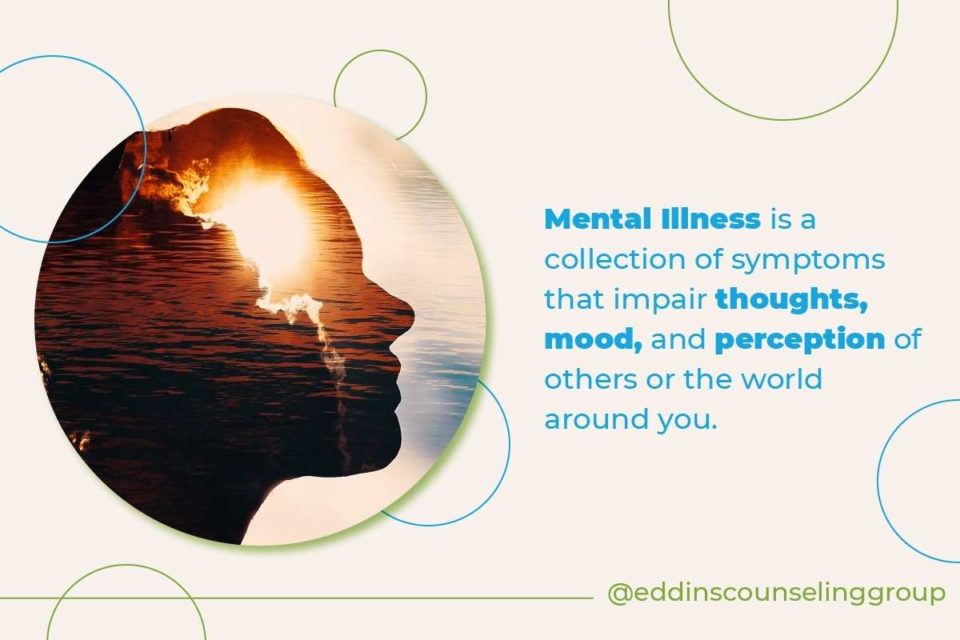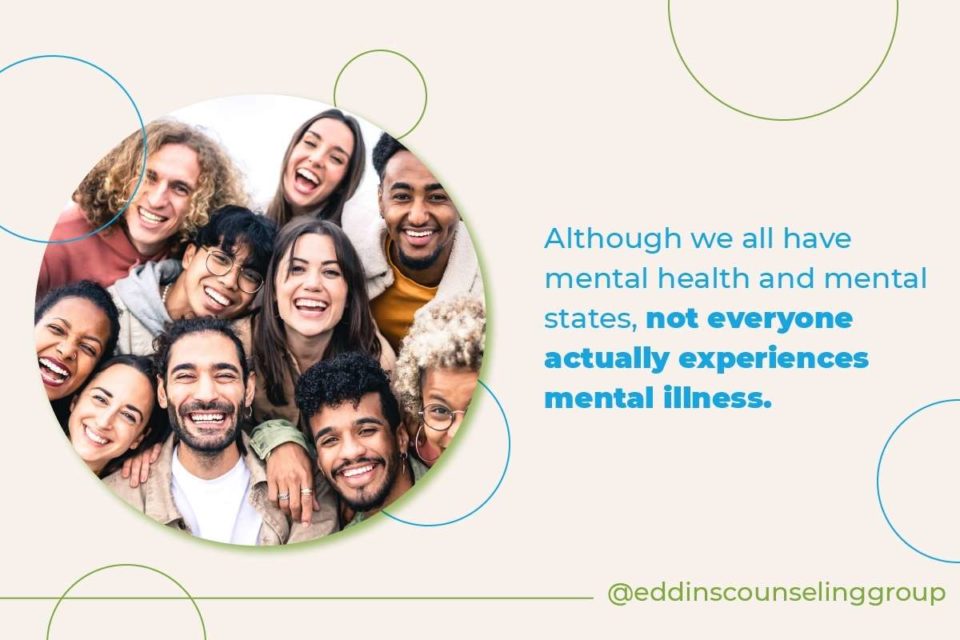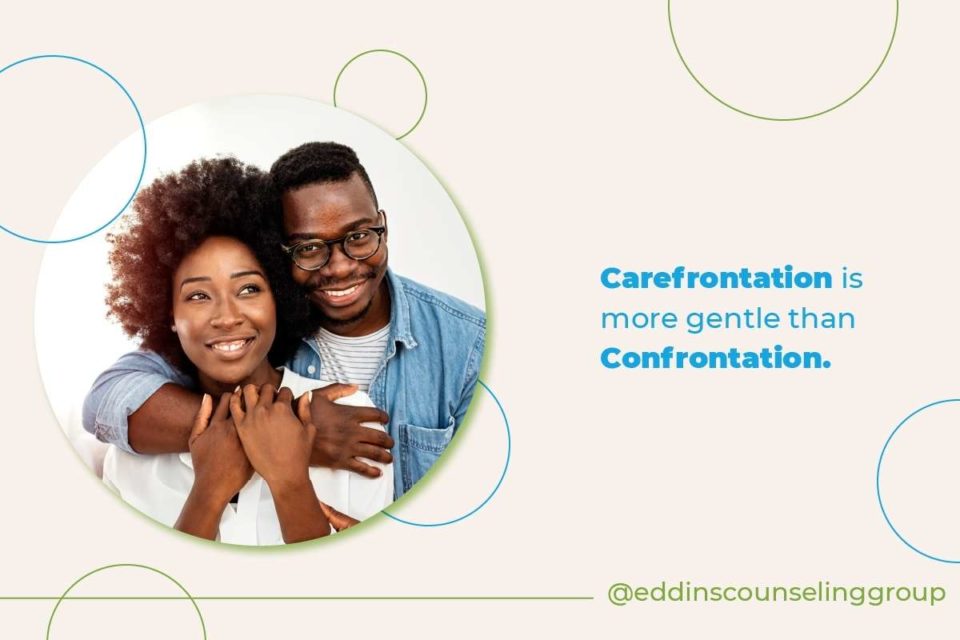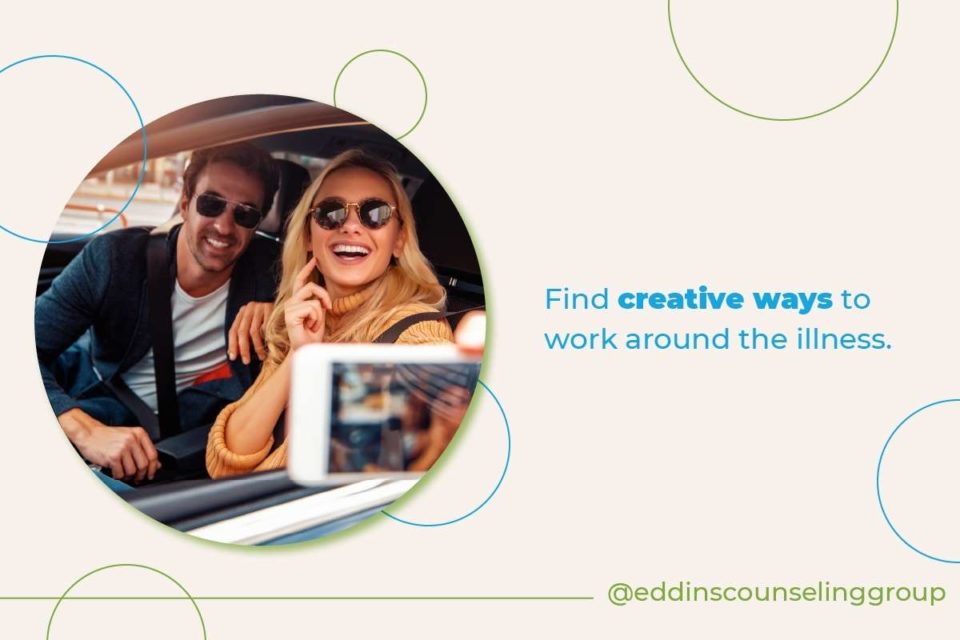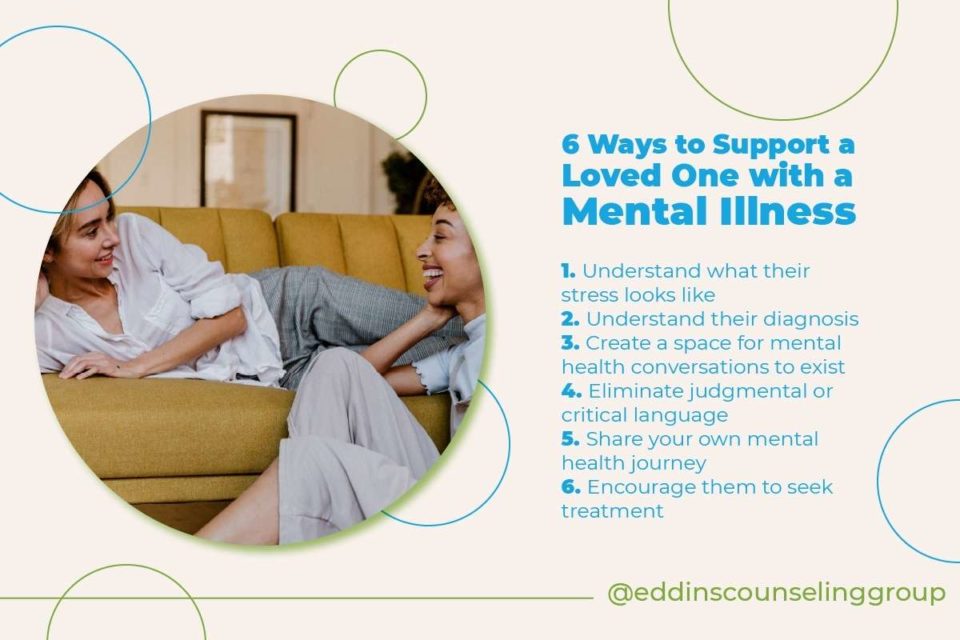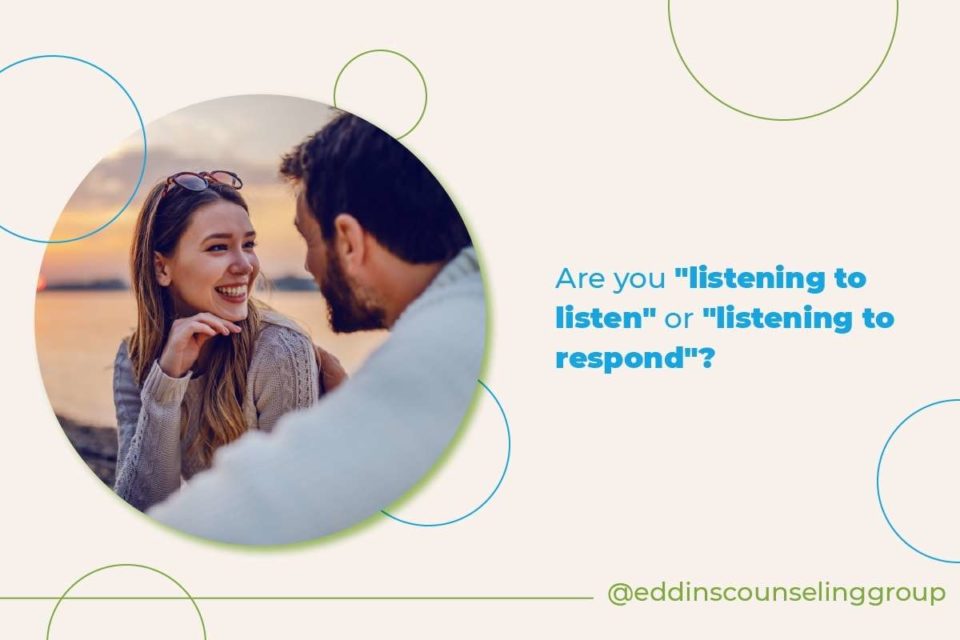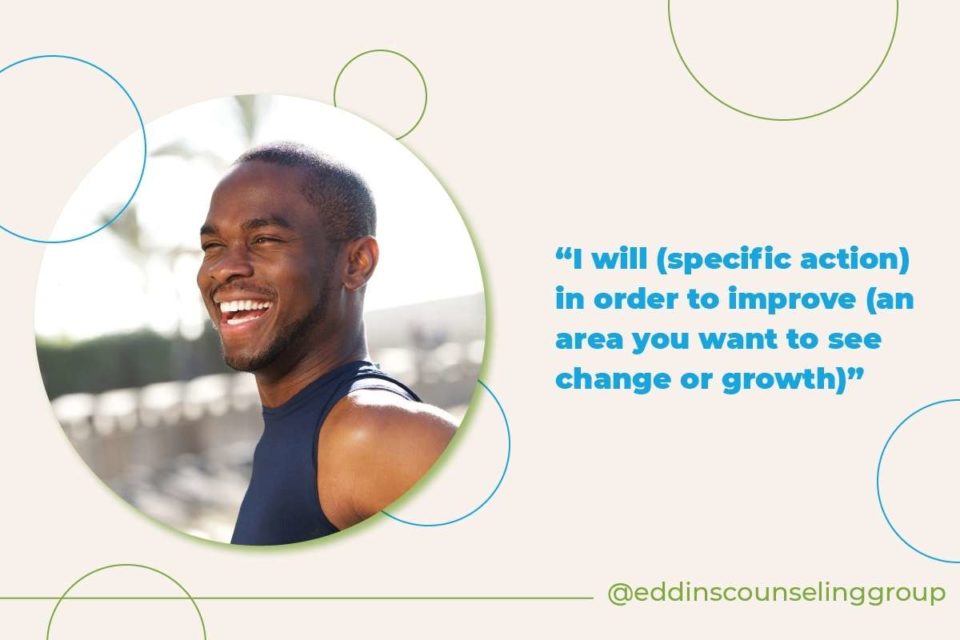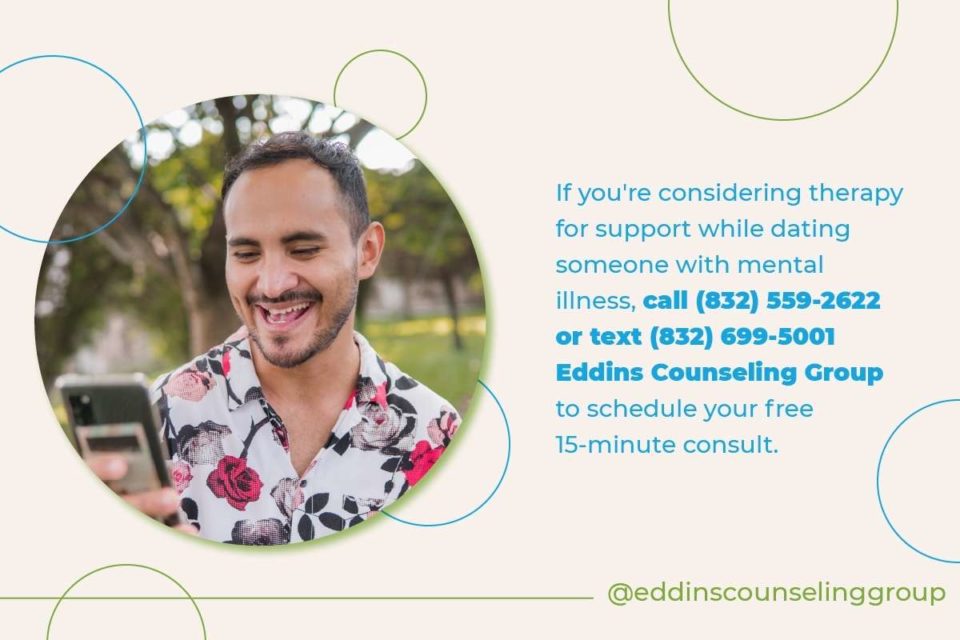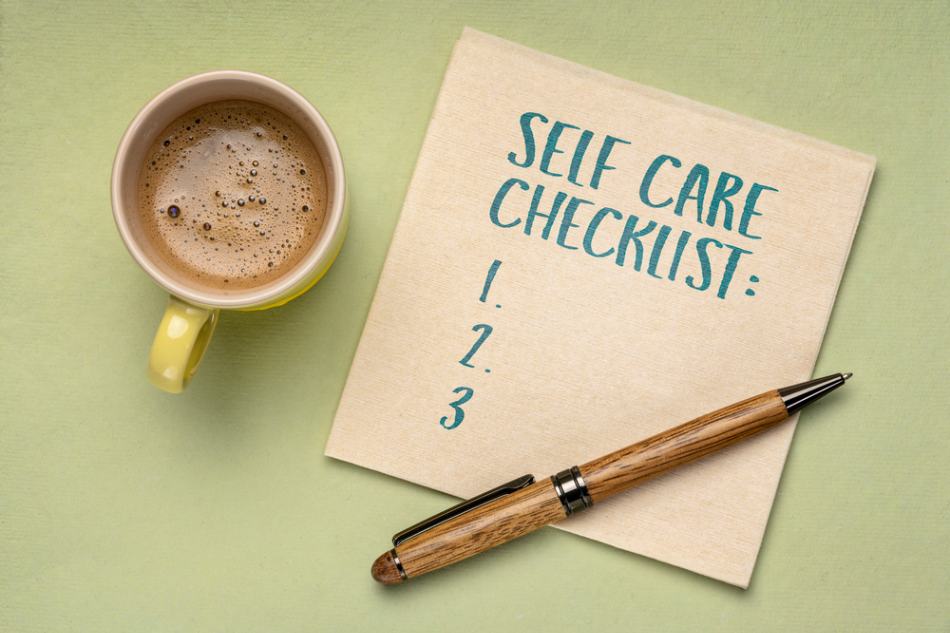September 9, 2021
Webinar: Dating Someone with a Mental Illness
Written by Rachel Eddins
Posted in Relationships, Couples, Marriage, Webinars and with tags: Narcissistic, dating, mental illness

Dating someone with a diagnosed mental illness can be hard for everyone in the relationship.
In this webinar, learn the complexities of mental health and ways to support your partner with a mental illness.
Facilitated by Kenisha Brown, LPC- Associate, LMFT- Associate.
Watch a replay of the presentation here.
Learn more about our couples therapy services.
Here is a transcription of the webinar:
I like to start by just giving a brief background of really why this was a dire topic of choice. So one of my specialties is working with couples. Ultimately in a couple of settings, a lot of individual issues and challenges also come about.
And thought it would be really important to talk about strategies and ways to set healthy boundaries while dating someone who may be experiencing mental health challenges amidst managing our own day-to-day lives.
Mental Health
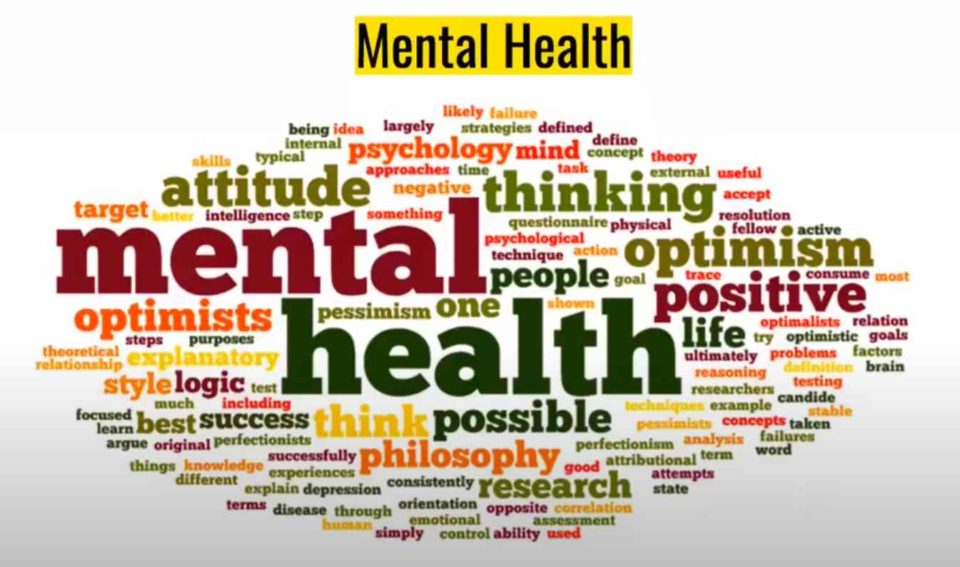
This is our first slide. What comes to mind? I have this word cloud here, and there are definitely a few words. That may be ordinary or, pretty typical to think of.
So what comes to mind?
I see sickness. So sickness comes to mind, for one when they hear the term mental health. There are almost synonyms and antonyms on here, which is pretty ironic. So we’ll definitely dive into how all of this comes into play.
I see life stressors, depression, anxiety, and well-being. So, you see a lot of pros and cons even in this word cloud as I’m looking at it. And it’s a lot to take in. So we’ll get to the formal definition in just a bit.
Read more: mental health vs emotional health.
Mental Illness
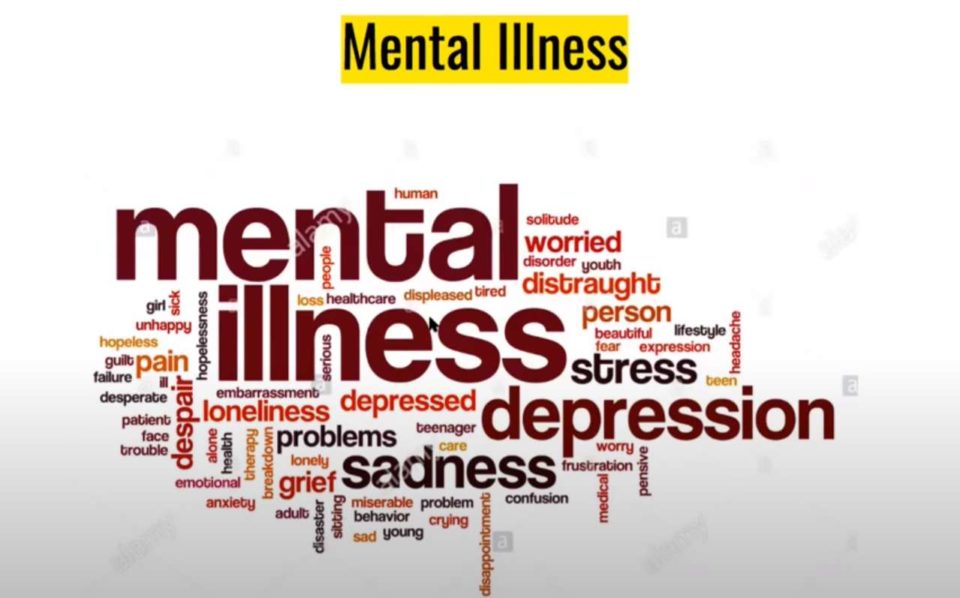
What about mental illness?
Does this term differ from the term mental health? If so, in what way? What comes to mind when you hear the term mental illness? So in this word cloud, we see quite a few different things.
Hopelessness is pretty common. One of the main indicators. Also worried, and distraught. Any thoughts about whether mental illness and mental health differ, or any opinions about it being similar? What comes to mind when you hear the term mental illness? Do the same thoughts resonate compared to when you heard about mental health?
So even as we resonate in comparison to both word clouds, I’m noticing a lot more of the unpleasant terms are used here on this slide. In this word cloud for mental illness as opposed to the version for mental health, there was more hopeful language and terminology used. So let’s get into it.
Mental Health vs. Mental Illness
The definitions of mental health versus mental illness and how the two differ:
What is mental health?
The overall state of mental being/sense of psychological being.
What is mental illness?
A collection of symptoms that impair thoughts, mood, and perception of others or the world around you.
Mental health is our overall state of mental being, our sense of wellness compared to mental illness, which is a collection of symptoms, and these symptoms are in their own thoughts, our mood, our perception of others as well as the world around us.
Mental illness definitely shows up a bit differently because we see forms of impairment with mental illness. So I would like to highlight at this time that:
Although we all have mental health and mental states, not everyone actually experiences mental illness.
So that’s one difference. Mental illness could also be experienced during a period. So it does not have to be indefinite, it could be brief, could be long-term. So those things differ as well in comparison as far as frequency and how they present. We’ll get into some examples and more background and understanding about how the two differ and how it shows up.
Examples of Mental Illness:
- Mood disorders: depression, bipolar;
- Eating disorders: anorexia, bulimia;
- Personality disorders: narcissism, borderline, antisocial;
- Anxiety disorders: panic d/o, social anxiety, GAD, specific phobias.
Possibly you’ve heard of them. However, one thing I would highlight is that it seems like especially more recently, more recent generations use these terms out of context, out of their true definitions.
Of the examples, there are different categories here. So you have different mood disorders, eating disorders, substance-related disorders, personality disorders, and anxiety disorders. And this list is not exhaustive.
Recognizing Signs of Mental Illness in a Loved One
So I want to get into a little bit about how mental illness presents and how it can be spotted in our loved ones. One of the key indicators is that it impairs our level of functioning. And by that, I mean typical day-to-day operations.
So, let’s say our carry-through at work, right? Maybe being a little bit more distracted or arriving at work late more frequently, a little bit disorganized.
It also could possibly impair our personal relationships. So intimate relationships, and platonic relationships as well. So maybe, someone experiencing mental illness or a partner of ours may be a little bit more easily tempered lately. Possibly it looks like being a little bit more distant, maybe even a little bit disengaged, like they’re present, but not necessarily.
So the different ways that it impairs us could show up in different forms. Whether it be school, whether it be work, whether it be relationships, whether it be even our own self-care and how we are managing or lacking to manage our day-to-day tasks.
Not all the time, but oftentimes, it can be observable by others because you start to notice life changes. So we’ll get into a few of these specific disorders. I do want to highlight that it is not used to self-diagnose or diagnose your partner or anyone else.
So I’m going to be reviewing a brief, general background about some of these disorders and some of the features that you may notice. However, there are more specific criteria as far as, like, frequency, how long you have to be experiencing these symptoms, and things like that and so forth. So let’s get into it.
What Mental Illness is Like for Them: Key Features
- Anxiety: excessive worry about any and everything that is difficult to manage
- Depression: deeper levels of sadness that lead to beliefs about self-worth, how others feel about you, and at times, suicidal ideation
For example, anxiety and depression are the most common mood disorders. For anxiety specifically, this one could honestly be hard to detect because all of us as humans, at some point, do experience different levels of anxiety. At a point to where it starts to impair you or to a point to where your malfunctioning is too much. And so our reactions are definitely over the top to things and instances that really aren’t too threatening.
Anxiety
So general or mad, very low-level anxiety actually helps us function and operate day to day. But when it’s too intense and experienced too often, it can definitely impact how we show up in the world around us. So having excessive worry about any and everything that’s difficult to manage. Another key indicator is difficulty controlling those thoughts. So maybe it’s just a lot more difficult to relax at the end of the day. Maybe it’s even difficult falling asleep because of all of the To-do lists and all of the different thoughts going on. And so with anxiety specifically, there are different forms as well.
Depression
With depression, it looks like much deeper levels of sadness. And so you may hear people casually say, “Oh, I’m depressed or they’re depressed”. It isn’t to be taken lightly because again, it also impacts our worldview and how we operate day to day.
And this is one of those where it could be just a depressive episode. So we may see a loved one or our partner having ups and downs and highs and lows and so also how they’re responding right to others could be an indicator of what that looks like for them.
Personality Disorders
Personality Disorders: either no awareness of their behavior or a slight awareness, but an inability to stop it.
So, then we have personality disorders. Personality disorders typically aren’t diagnosed until adulthood. And so with these, it is a lot more tricky because the person who experienced it typically has no awareness of their behavior or very low awareness.
So think about it. Is this the type of person who would likely seek treatment on their own if they don’t have awareness and they have these behaviors going on? Sometimes it’s pretty difficult for a loved one or a partner even who may be struggling to manage day-to-day because they are having shown traits of a personality disorder.
Borderline:
Having no internal governor; experience deep love and deep rage; feel deep connections with people, but will also attack those closest to them out of fear of losing them. Experiencing a constant internal battle trying to convince themselves that people don’t hate them. Rejection is a frequent theme.
Borderline is experiencing like I’m on and I’m off. So it’s almost like jumping in and then I close the door on you. So it’s a push and pull process. So someone struggling with borderline personality disorder, they’re going to attack those closest to them out of fear of losing them. So at the heart of it is the desire and the need for connection.
However, there is also a really strong fear of abandonment. And so it’s not whether it be right, factual, or evidence to support these thoughts of leading to abandonment, it’s more about how the person perceives it and experiences it.
One rule of thumb definitely for these specific types of disorders is that oftentimes as a loved one engaging with someone with a personality disorder, it could be easy to personalize their reactions and also impact our mental health overall.
Boundaries
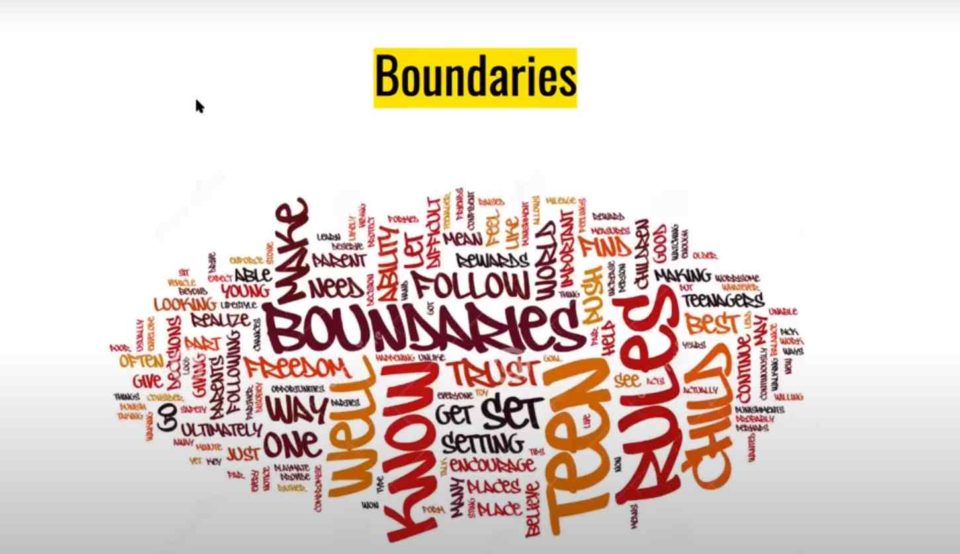
What comes to mind when you hear the word boundaries?
Looking at the word cloud, maybe some of those words stick out to you. What do you believe about boundaries?
So, we see a multitude of things, like trust, setting, encouragement, limitations, a bubble of protection (oftentimes I think I actually heard it described as that way of knowing yourself in your own bubble and protecting your bubble), guidance, standards, self-care…
Boundaries are basically the essence of knowing where you begin and where another person ends, which can be challenging sometimes, especially in a relationship with those closest to us. Oftentimes we’re put to the challenge of “Are we going to implement boundaries? Are we going to set a boundary? And also are we going to maintain those boundaries?”
Often times it’s easy to indicate when our boundaries are lacking because we feel exhausted by it, maybe we feel an incongruence meaning we value one thing and we are aiming for one thing, but our actions say something otherwise. Especially in relationships and intimate relationships. Keeping those lines unblurred is a task, or it can be a challenge.
I also see on the cloud what I’m able to give myself and others and what I’m willing to give won’t burn me out. It’s the task of when we set a boundary that we sign up and we allow things that aren’t going to deplete us or exhaust us. When we are willing to help, ultimately it is not a burden. We’re not carrying more weight than the actual person who’s responsible for it.
Questions to Ask Yourself in Setting Relationship Boundaries
I wanted to add just some questions to reflect on, questions to ask yourself. To highlight again, everyone experiences mental health, and we all have to work to strive for our mental strength daily. We have a choice at the end of the day if we’re going to cope positively or if we’re going to cope in maybe a not-so-healthy manner. So either decision, typically we all cope, and it’s up to us what that form looks like. And so in relation to boundaries, a question to ask yourself is:
What is your partner’s responsibility in their mental health?
- Overall health, remaining active in treatment, creating a system for themselves, gathering their support system, accessing services
- Following through with their appointments, following through with doctor and therapist recommendations
- To cue you when they are experiencing shifts
- To articulate ways that they feel supported
When we’re setting boundaries, we do have to be clear about what we’re responsible for and what others are responsible for. So some ideas here, are they’re responsible for their overall health, they’re responsible for remaining active in treatment if they so choose to be in treatment. Creating a system for themselves and gathering their support system and access to service.
A lot of these ideas are indicating that we actually don’t have control over our partner. No matter how badly you may want to be there in support, we cannot control that person. Getting a clear vision of what they’re responsible for is an important question to ask.
Another boundary is to cue you when they’re experiencing shifts. So when they’re having lows. To be able to detect that and ask for help, can be challenging.
What could be a barrier for someone to actually cue you in when they’re struggling?
Especially social media. Oftentimes when we all engage in social media, if you’re active on it, you notice people post their accomplishments. It’s very rare that people go on there to post real-deal daily hassles that we all experience.
And it almost creates this culture of perfection and striving for it. So it can be challenging to be vulnerable in that sense, to cue you in on: “Hey, I’m struggling! Or maybe I think I’m having an episode. Maybe I’m spiraling.” That can be tough because of fear, ultimately of judgment.
Sometimes, it’s not that we truly don’t want to ask for help. I don’t even know what it looks like to write: “I’m struggling with this. Or maybe I don’t even understand how to identify the feelings that are attached to this.”
And last but not least on this list, they’re responsible to articulate ways that they feel supported.
So it might work with couples oftentimes and also just even casually as I’m speaking to people typically, and we joke about, “Oh my goodness, how nice would it be for our partner to just read our minds, to just know without me having to tell them?”
So the reality of it is that we do want to set our partners up for success and we want our partners to set us up for success. And what I mean by that is that if you don’t give me a cheap code of what you want and what you need and what you desire, it’s definitely hard to say that I know. How will I know? And so when we assume it makes things challenging.
Best case scenario, to articulate ways that you feel supported. So that, you do this advanced plan ahead and ahead of time. You guys are emotionally connected and you can plan ahead for spirals or maybe holidays which is a more challenging time for that person. And by them disclosing how they feel more comforted. Or what they need to be in solidarity with you ahead of time, you can plan ahead for that. Those are some examples of what your partner can be responsible for.
What Is My Responsibility?
Another question to ask ourselves is what is my responsibility? Because when we are in a committed relationship, we do hold some of that weight. Ultimately, as I highlighted before, we are not their doctor, we are not their therapist. Oftentimes if we turn into those roles of like teacher mode, a parent, or being pretty demanding, it creates a distance and ultimately, inevitably almost our partner can withdraw. Then there’s more isolation and alienation. So, what is my responsibility?
Here are some examples:
- Be honest about your feelings, emotional needs, limitations, fears, concerns
- Remind them of the goals they have for themselves, to gently confront them on any shift in behaviors
- Find creative ways to work around the illness
- Offer perspective
- Stay connected, outside of the illness
- Self-care: Give yourself respite as needed
- Engage the support system when you notice changes.
So first, be honest and open about your feelings. We all have needs, whether or not they’ve been honored in the past or right, certain circumstances that are probably up for debate. But we have needs, we have limitations, we have fears, we have concerns.
Being transparent about those, and having critical conversations. I am personally a fan of critical conversations because what’s said often sets the leeway in a room to address and support. Silence oftentimes leads us to fill in our own blank. So when we can be transparent about how we’re feeling about things and our limitations, then we can actually come up with a game plan. We can actually get to some level of understanding.
So ask yourself, okay, what else is my responsibility?
I am in a partnership with someone who actively maybe experiences downfalls, episodes, or maybe highs and lows with their mental health.
Reminding them of the goals that they have for themselves but try not to communicate where it’s coming across as critical or judgey. I like to call it carefrontation.
And notice how that’s different from confrontation. Confrontation can be a lot less gentle. So with carefrontation, it’s more gentle. We can still hold our partners accountable and remind them: “Hey, when did you say you wanted to meet that goal?” Or accountability partner? We often call them those as well, right? So that can be something we’re responsible for.
And also highlighting behaviors, “Hey, I noticed maybe you haven’t been doing your morning walk? There’s something going on?” Picking up on those cues can be part of that. And opening the dialogue for that can be really important.
Finding creative ways to work around the illness.
I really want to highlight that for someone who is experiencing mental health challenges, this does not lead them. This is not their deathbed. They are still able to be active. And that’s not the only factor. So, offering perspective when asked. No one likes to have that feedback given right when it wasn’t desired.
Staying connected outside of the illness.
Making sure that the figure that we are in this relationship is not consumed by their mental health challenge. At the end of the day, you want to have other forms of connection. That can be an important piece of the relationship but not the whole thing. Because guess what? Again, as I explained, mental illness can come in waves and episodes. So when they are more on a high or they are thriving through life, then what will connect you? So make sure that you actually have other interests and other ways to connect.
Self-care is probably the biggest one of giving yourself time and giving yourself time away.
While we are actively working to manage and support our partners and loved ones who may be experiencing daily hassles and challenges, we have our own. We call it adulting where life just happens. Sometimes we’re able to make lemonade out of it, sometimes not quite. Given ourselves the adequate time that we need to self-soothe and relax.
This last one can be another big indicator of adding on a support system. So when you think about it, you are in this partnership. Be curious about are there any other forms of support that I can use.
When you think of social support, there are actually different forms. So whether it be a tangible form of support. or resources connecting you to good resources, whether it just be emotional support, is there any way to delegate some of those avenues. Open accessibility for some of that weight to be lifted from you. So that could be an important form to write, give and take and also add balance to make sure that ultimately you’re caring for yourself at the end of the day.
Is This Interdependence or Dependence?
Dependence: “Emotional dependency is when a person believes they need another person to survive, to be happy or to feel complete.”
Interdependence: “Is when two people, are involved with each other, but without sacrificing themselves or compromising their values”.
Another question to ask yourself: “Is this interdependence or is this dependence?” And by codependent, I am referring to:
Do I truly want to be with this person or am I just kind of afraid? If I leave, what is next? I’ve always relied on them for X, Y and Z and will I have that?
In terms of thinking of dependence and independence, a simple way to put it is dependency is when a person believes they need another person to survive and be happy or to feel complete.
Which very much differs from two people who choose one another. But they’re not sacrificing themselves, they’re not compromising their values. The things that feel very important to them and very core to them still coexist within the relationship.
Thinking about what that could look like as a form of independence.
Maybe we have common rituals for the two of us to go have a date night at a certain place and maybe Sundays are reserved for our time. But still have Friday nights for my girl time. So maybe we have some similar interests in hobbies, but we also have the opportunity in time for our own hobbies that maybe our partner isn’t actually interested in. We don’t feel obligated to eliminate those things that are core to us.
Ways to Support a Loved One with a Mental Illness
-
Understand what their stress looks like
Understanding what your partner’s stress looks like is pretty important. When we can understand what their stress looks like we can also understand what calms them, what soothes them. And so this first one honestly isn’t an easy thing to detect, because guess what? If I want to hide it, I could be good at it. I can possibly learn how to hide the symptoms.
Or maybe even if you ask directly, “Hey, is everything okay? Or I’m just checking in!” Or you use your carefrontation skill that I briefly mentioned not too long ago, you have to depend on them being honest and transparent.
So picking up on cues and understanding what their stress looks like, and what is their routine? Because guess what, whether they’re in a relationship or not, routine is going to be very valuable and important for someone experiencing mental health challenges. So having a common ground in a routine to turn to.
-
Understand their diagnosis
One of the factors and elements of the day-to-day is to also increase understanding ultimately. And when we can better understand our partners, we can definitely bridge and show the emotional connection. We grow in empathy. And we also grow closer together. So whether it be understanding their triggers. Different parts of what’s going to make them feel comfortable.
-
Create a space for mental health conversations to exist
Reflect on what could be a good way to open that pathway in creating a safe space for mental health conversations to exist. One of the common ones is: “How are you feeling?”As I think about it, that’s often time used as a casual day-to-day breather. So you might ask someone, “Hey, how’s your day? Or how are you?” I can think of the common response “Good! Great! Fine.” And those are very surface-level feelings. So when we have more intimate spaces and intimate connections, it is important to create that space for deeper dialogue surrounding mental health.
-
Eliminate judgmental or critical language
When we use criticism, it is most definitely true that oftentimes it is the fear taking over or maybe even the anger, which are secondary emotions. There are more emotions at the core, which we call primary emotions. So maybe really underneath the anger is hurt, maybe it’s fear. When we can use our language to be vulnerable and demonstrate that rather than criticism, we definitely have more leeway. Now I can actually hear you. I can hear your responses. When we start softer and gentler, we can open that pathway of creating emotional safety, which is ultimately needed to have those faces to disclose and have these day-to-day real-life discussions.
-
Share your own mental health journey
Reflect on the things that you do day to day to maintain mental strength. What does it look like? Does it look like making sure you have two minutes to yourself throughout your busy day? Does it look like making sure you get some exercise in and for example, even a simple disclosure of: “Oh wow, I’ve been a lot more snappy lately. I noticed. I’m like, I think I’m snapping at my coworkers or clients. This just seems so unlike me. I think I better start cooking at home more. I think I better start meal prepping.”
And sharing how you maintain your own mental health can be a conversation starter and opener because that can also elude trust when we’re vulnerable. Oftentimes vulnerability from our partners can proceed when we can set that standard.
“I noticed you seem a little more quiet or sad lately. Is this right? Would you like to talk about it?” That can open the dialogue, right? Maybe for the first time, someone actually sees me. And oftentimes it’s not all spaces or environments that we have that opportunity for safety. So especially in an intimate relationship or with your partner, it is important to create that space.
-
Encourage them to seek treatment
Another way to support them is by encouraging them to seek treatment. That is not telling them to seek treatment, but encouraging them, whether it is offering it as an option, amongst other things, to seek support and also asking them directly: “How can I support? How can I help?”
Does it seem like maybe you’re experiencing a low? What can I do?” Or offering a suggestion: “Hey, I was thinking about X, Y and Z. Would that be okay?” Oftentimes takes the weight of them having to assign you a task as well. So that could be another option.
Interventions for You to Practice with Your Loved One
- Listen
- Practice empathy
- See them as a person, not an illness
- Identify self-soothing techniques
- Be willing to learn and apply
- Be patient, Be mindful of triggers
- Meet them where they are
- Utilize independence
- Reflect on why you value the relationship
Listening
This is active listening. So listen not to respond, but to fully get the picture. I want to share a quick technique that can be really helpful as a listener.
To encourage you to be curious, which allows asking more questions to get the full story in that background and also make sure that you’ve got it right before you respond.
We can call it paraphrasing or parroting, which may seem so elementary, but it can mean a thousand words. Actually feeling seen and validated can be very important.
Listening to listen and not to respond, and sometimes really that’s all we long for.
Maybe I’m not quite seeking a solution, or maybe I don’t really want the advice. I just really want to be heard. And that can go a long way with a partner experiencing a challenging time.
Practicing Empathy
I’d like to highlight that some of these are not skills that come naturally to us. It’s okay if we are not the master of these things. Putting yourself out there and being open to learning or growing in these areas is also a pinpoint. Which can be challenging to do. I’ve never actually seen empathy before. What does it look like to get more familiar with it?
See Them as a Person, Not an Illness
Mental illness is not the full picture, it’s just a portion. Treating them as humans, as you would with respect, as you would any human.
Identifying Self-soothing Techniques
Not only for you but also for them. Oftentimes when we go from zero to 100, or when we’re spiraling, it’s because we feel like we don’t have the adequate resources to stay afloat. So we may start to slowly drift from: “Wow, for the past month, I was thriving, and now I’m starting to struggle a little bit more and a little bit more frequently”.
Being Willing to Learn
Whether that looks like learning from them by dialoguing, asking questions if they’re open to sharing and teaching, not ultimately expecting that, or whether it’s looking like you figuring out other avenues to learn and apply what you’re learning throughout your relationship.
Being patient, and being mindful of triggers are also interventions. Meeting them where they are as opposed to meeting them where you’d hope they should be. So when we get to “should” we start thinking in error? “Well, you should be over it. You should be able to get out of bed by now. It’s been however many days or however many months”. And so when we can step down to their level and comfort and really see them, it does wonders and ultimately create safety. Because you have acceptance when you meet someone where they are.
Reflecting on Why You Value the Relationship
I’m sure most of you have heard of the honeymoon stage. Most predictors research, given that some of this starts to die down at approximately six months up to the year. That’s where you really get to see the true colors and how you operate and feed off one another. So reflecting on why you value the relationship might not come as easy because we become masters at pointing out the things that possibly bother us what our partner does.
“Oh, can’t stand they do this. Oh, I’m so not pleased with this.”
I encourage you and I challenge you to do the exact opposite. Create a culture of appreciation. And actually, verbalize it. Sometimes it may be right. You’re looking at your partner. “Oh, wow. throughout the ups and downs, this is the one thing they’re humor. I just love that about them.”
Maybe you’re keeping it to yourself, encourage you to vocalize. Those things that you write are keeping you charmed and admired and present in the relationship.
Toxic Relationships
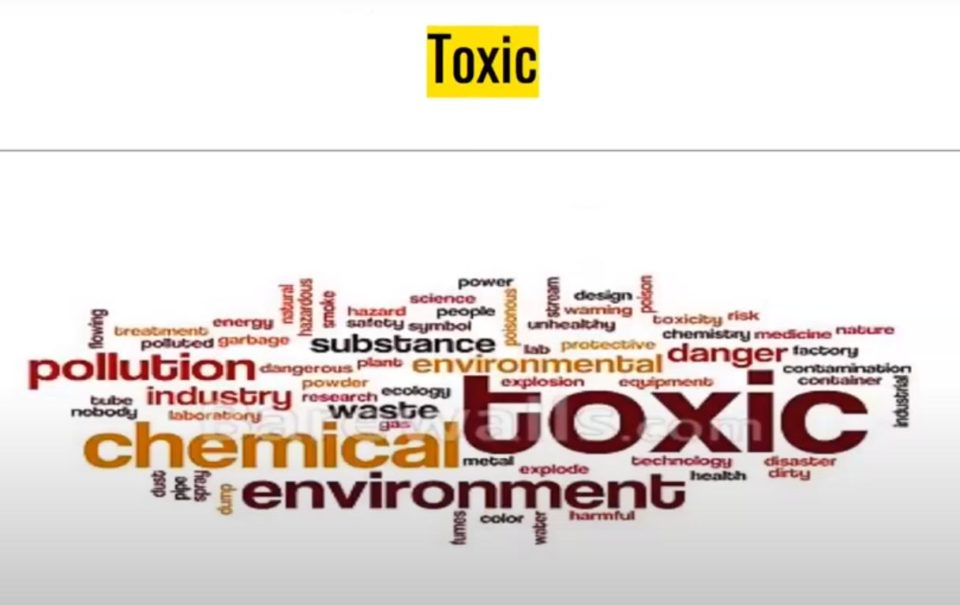
What comes to mind when you hear the word toxic?
Some of these words from the word cloud might resonate. But what comes to mind when you hear the word toxic and think about it?
Are you the toxic one?
Not a good environment or person, a negative relationship. When you think of toxic, ultimately, it’s probably not a relationship that’s going to be able to be going on quite long because you get burnt out. So we’ll get to the definition in just a bit.
Abuse
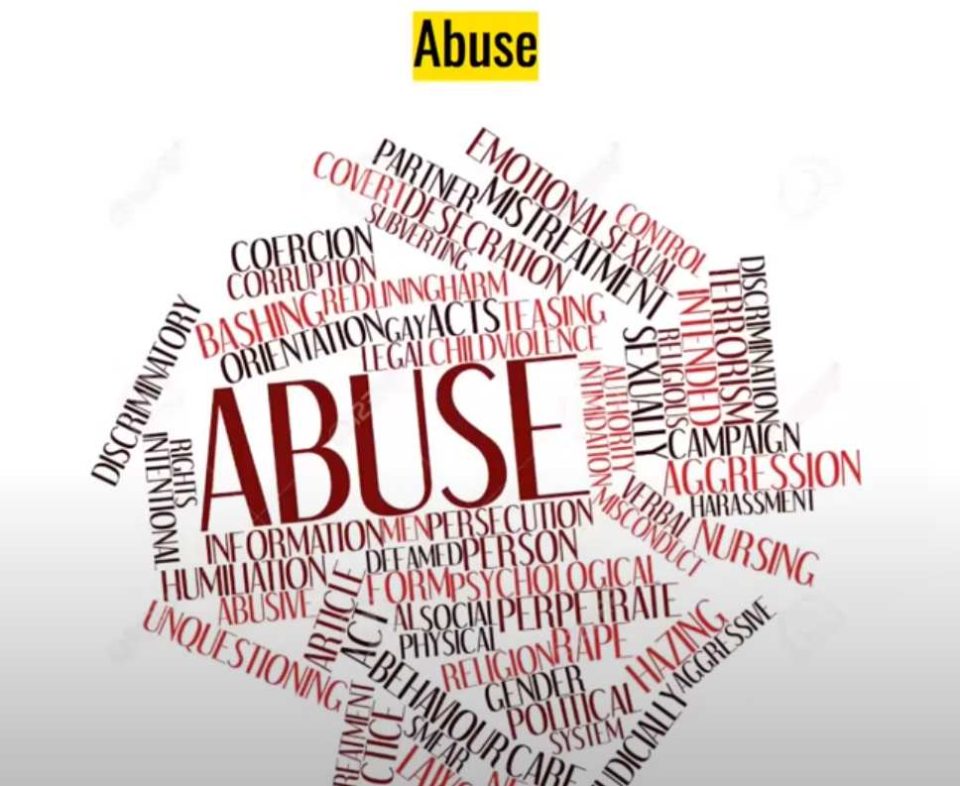
What comes to mind when you hear abuse?
Of course, there are several different forms of abuse. Especially in intimate relationships.
What comes to mind when you hear that word? There are different things here. Humiliation, bashing, emotional, sexual, and mistreatment. So I see learned behavior, which is a good valid point. So some of this could be in history and generational history of where the barrier is and it gets passed down from generation to generation. “I was abused. So possibly I abused.”
Reactive and autopilot are very different from acting and thinking things through, just second nature. So as we get into this, I like to highlight at any stage of experiencing abuse, there’s ultimately a cycle of abuse mixed with mental illness.
Sometimes it can be a situation where manipulation and gas lighting and things of that nature can be used in hopes of deeming you to stay in the relationship. So I just like to highlight that if at any point you are in a situation experiencing abuse, I definitely encourage a form of an exit strategy.
The Difference Between Toxic versus Abuse
Toxicity: An unhealthy relationship dynamic
Abuse: About power and control, a need to control a person’s thoughts, actions, feelings, etc. Severity and frequency are key differences.
So toxicity is definitely an unhealthy relational dynamic. However, abuse very much differs because of the intensity. Abuse at the end of the day is about power and control. So oftentimes this can be shown in different elements.
Maybe it is through financially. “I’m going to cut you off and make you more dependent slowly but surely. Maybe it is in different avenues of I’m going to say things that have you doubting yourself.” We call that gaslighting. Of where you start to lose part of that intuition and trust and ability.
“Can I actually trust myself? Am I making the right decision or becoming reliant on my partner to do all of the decision-making?” So although in a toxic environment or relationship you do feel exhausted, it’s likely not something that can go on forever. When it comes to abuse, it is a lot more lethal in a way and also comes with a lot more blind spots.
When we’re in the cycle of beginning stages and they always say when you’re in love, oftentimes it’s easy to experience and let some of those red flags fly. When you can make an active choice about what you entail, what you deserve, and what you want, you can start to recreate some of those dynamics and move away from toxicity to healthier lines by implementing boundaries.
How do you differentiate toxic vs. abuse?
Toxicity is definitely not an environment to sustain or be in. When we think of forms of abuse, it is oftentimes a lot more severe in those relationships because of the desire or need or that partner to want to power in demand power and control. And that’s just almost kind of abuse comparing healthy coping compared to unhealthy coping.
Take Charge of your Mental Health
Create a plan to address your wellness within the next 7 days!
“I will (specific action) in order to improve (an area you want to see change or growth)”
I would like to leave you all also with the charge. As you reflect, create a plan to address your wellness within this week. So within the next seven days doesn’t have to be a plan you actively implement today. You have throughout the week. But as you consider and reflect, think about what will you do. Name a specific action. I will what in order to improve what area that you like to see changing growth in.
So whether it be a change in a way of how you show up in your relationship to better support your loved ones who may be experiencing mental health challenges. Whether it be right away to also support healthier dynamics so that you can be on a greater path for maintaining mental strength. What would it look like for you? What’s your plan?
For example, exercise. I will plan to exercise in order to recharge. It can be formal or just be brief and free.
So I like to share my commitment to this charge. I will be more intentional about being present. So I’m tuning into my active listening in order to improve opportunities around me. Proactive compassion; self-compassion can definitely do wonders.
Questions?
How do you handle situations where you experience arguments or toxic behavior and your partner does not remember anything the next day or is unaffected by it?
I can honestly acknowledge that this is a tough spot to sit in. It sounds like wanting to be proactive about creating a dynamic of how you interact with one another. So ultimately, I’d encourage anyone in this position to reflect on what’s your willingness to change. We can become masters at pointing out the flaws in our partners or the downsides.
And ultimately, as expressed, we can only control ourselves in the situation. So showing up as your best self, what would that look like? Sometimes it looks like putting on a mature hat even when we don’t want to. Sometimes it looks like no longer feeding into something that does not serve us in any way. So when we are experiencing up and down and maybe we have a partner who won, it’s very difficult to get them to take accountability. Or maybe they have no interest in taking accountability. Then there is still a decision to be made of.
Is there hope for this person to change? Are they willing to create a plan for change? Are they not?
If he’s into it now, how do you make him aware of the fact that his actions bring consequences?
I charge anyone in this position to think about what can you control? Get clearer on what you can control in that dynamic. Think about it. What can I control? Can I control what he does or what he/she does?. Can I control how they will react when I set a boundary?
Something that is within our control is okay. I’m going to set a boundary. If I say something, “Hey, I’m not comfortable with this and it continues to occur, then I then have a choice of what consequence is it going to be of overstepping my bubble.” What do I have control over and can I take action for what I actually have control over? Get clearer in that because again, we can use carefrontation. We can dialogue and attempt to bring more awareness. But really the work and the will has to come from that person.
I can control only myself.
Anyone interested specifically as well, individual or couple support. I work with young adults. I also work with couples, primarily those experiencing relational issues, mood disorders, life transitions, and stress management. Those are typical areas.
Next Steps
So as far as groups you can check out our site and see what running groups we have and see if any of those fit you for sure as well. And also allied groups that are a form of a group of supporters of those who have loved ones who are experiencing substance use disorders. And so not that the person actually attends these groups. These are the support groups. So there are definitely support groups set for those who are the caretakers as well.
Well, I want to thank everyone for your time. You could have been anywhere but you chose to tune in here for this webinar and your support and your engagement have been everything. Thank you, guys.
Grounding & Self Soothing
Get instant access to your free ebook.

